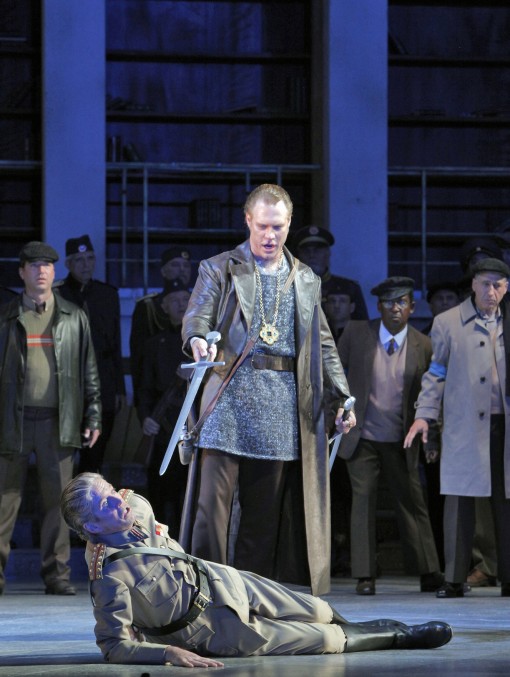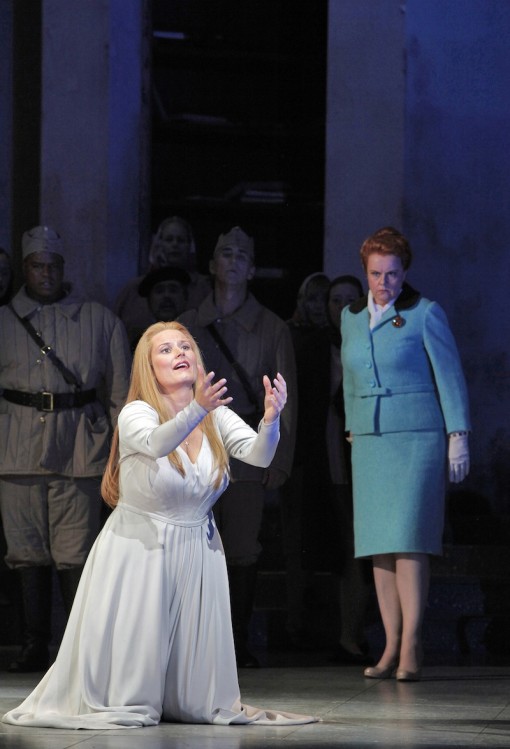Jovanovich makes magnificent role debut in San Francisco Opera’s incoherent Cold War “Lohengrin”

Brandon Jovanovich in the title role and Gerd Grochowski as Telramund in San Francisco Opera’s “Lohengrin.” Photo: Cory Weaver.
When Brandon Jovanovich took his curtain call Saturday night to a tumultuous ovation at the close of Wagner’s Lohengrin at San Francisco Opera, he took a moment to savor the loud cheers and applause, then, smiling broadly, wiped his brow and exhaled in a mock gesture of relief.
This was the American tenor’s role debut in the uber-taxing role of the mysterious, melancholy knight and his magnificent opening-night performance Saturday immediately and decisively places him among the leading Wagner tenors of our day.
The promise of his superb Siegmund in SFO’s Walküre last year was borne out by Saturday’s sensational performance. Jovanovich brought remarkable authority to the title role with seemingly effortless production, ardent dedication and tonal refinement. The tenor sang with a big, evenly produced tone and displayed consistent attention to the text and quickly shifting action. One can go a lifetime without hearing In fernem Land and Mein lieber Schwan sung with such delicate mezzo-voce sweetness and emotional resonance. Dramatically, Jovanovich was equally faultless, tall and noble of bearing, angered at his enemies and conflicted with Elsa’s persistence, without losing an essential dignity and spiritual center.
That was even more of an achievement considering the thankless production he was laden with. San Francisco Opera has presented yet another outing in which a superb cast is hobbled by an ill-advised revisionist staging that too often wound up detracting from some terrific vocalism.
Director Daniel Slater’s production, hailing from Houston and Geneva, has repositioned the action from 14th-century Brabant to an unnamed 1950s Eastern Bloc Soviet satellite country. King Heinrich is the leader of the pro-Soviet regime and Elsa’s raffish band appear to be pro-democracy insurgents.
At first blush, one would think the updating would offer a timely and trenchant take on religious freedom fighters with Wagner’s Christian mystic bringing a spiritual essence to the atheist Communist milieu.
Unfortunately Slater makes absolutely nothing out of the promising political possibilities of his own conceit, and his staging stubbornly fails to cohere. For starters, how do you explain the constant entreaties to God by the atheist Soviet puppet Heinrich? Clad in proto-Nazi military uniforms, Heinrich’s army is seen trashing the large library that serves as the main set at the opera’s opening. Yet once they accept and hail Lohengrin as their spiritual leader nothing apparently is changed, and a couple of the freedom fighters viciously beat up the defeated Telramund for sport.
There’s more. The bridal scene is introduced by the soldiers and rebels as drunken layabouts hanging out in the sacked library. Friedrich and Ortrud become homeless street people after their defeat (a topic with considerable local resonance in San Francisco). Slater’s revisionist staging completely falls apart in Act 3 with his corrosively cynical take on the wedding of Lohengrin and Elsa. Their bridal chamber is a claustrophobic raised gleaming white petit bourgeois cell with the couple standing stiffly as the curtain goes up like the groom and bride on a wedding cake. Introducing Elsa and Lohengrin as a domestic comic couple to be mocked and ridiculed—the tableau drawing audience laughter opening night—shows a stunningly insensitive directorial hand.
Robert Innes Hopkins’ sets and period costumes were striking and deftly handled but the entire production proved more incoherent than illuminating. When the blonde child Gottfried appears at the coda in khaki military uniform, the unsettling visual suggests Hitler Youth more than spiritual regeneration.
Jovanovich’s triumphant Lohengrin was the main story, yet the rest of the cast largely fared well. Though Camilla Nylund has sung the role of Lohengrin’s beloved in several European houses, the Finnish soprano sounded one size too small for Elsa in War Memorial Opera House, with her Act 1 dream emerging decidedly lightweight and slender of tone.
Yet Nylund etched a striking and vividly characterized portrayal and her performance grew vocally and dramatically throughout the evening. She wholly embodied the otherworldly qualities of the beatific heroine of Act 1, was impassioned in her confrontation with Lohengrin, and conveyed the conflicted and devastated woman of the final scene.
Having two German singers in the roles of the codependent villains paid admirable dividends. Clad in ill-fitting military uniform and jackboots, Gerd Grochowski’s Friedrich made an even more weak and ineffectual-seeming nemesis than usual, wholly dominated by his stronger wife, Ortrud. Vocally however, he was a superb Telramund, singing with a firmly projected bass-baritone though, like his colleagues, his characterization received little help from Slater’s inchoate conception.
Petra Lang’s initial appearance as Ortrud, bright red hair in a tight bun and ghastly turquoise business suit evoked memories of Lotte Lenya’s sadistic interrogator Rosa Klebb in From Russia with Love. Her high mezzo sacrificed a certain crucial vocal darkness in the role and while not as diabolically evil as some, Lang brought volume and vehement relish to Ortrud, whether brow-beating her hapless mate or drawing Elsa into her deceitful web.
Kristinn Sigmundsson made a dignified King (or Commandant) Heinrich, though the Icelandic bass’s large voice sounded rather hoary and frayed around the edges. Brian Mulligan was a heroic, clarion-toned Herald, and the San Francisco Opera Chorus sang with daunting corporate power and tonal refinement under Ian Robertson’s direction.
Conducting the first Wagner opera of his career, Nicola Luisotti showed a skillful and sensitive hand, and appears to be a worthy successor to Donald Runnicles in this repertory. The luminous string playing of the opening bars set the standard for a performance that brought out the shimmering lyricism and mystery of the score, yet there was no lack of weight or excitement in the great choruses and ensemble scenes. At the extreme right front of the house, the balances inevitably appeared weighted toward low brass, timpani and cymbals, and the orchestra fitfully overpowered the principals and even the chorus. Other patrons Saturday remarked on how burnished and well blended the orchestra sounded from more optimum seating.
Lohengrin runs through November 9. sfopera.com
